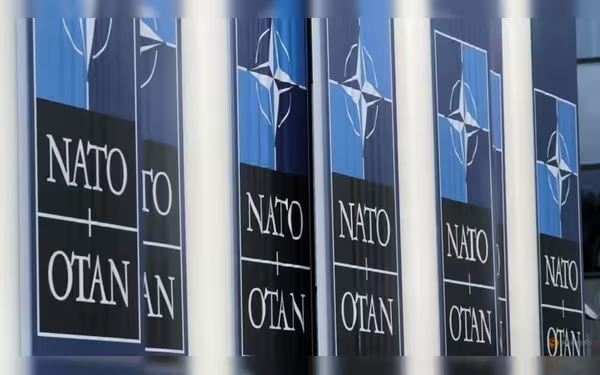Saturday, November 16, 2024 10:49 PM
Ukraine Participates in NATO Anti-Drone Exercise
- Ukraine joins NATO's first anti-drone exercise.
- NATO emphasizes need for advanced drone capabilities.
- Russia plans significant increase in drone production.
 Image Credits: channelnewsasia
Image Credits: channelnewsasiaUkraine participates in NATO's anti-drone exercise, highlighting the importance of advanced drone capabilities amid evolving military technology.
In recent years, the conflict in Ukraine has highlighted the increasing importance of unmanned systems, particularly drones, in modern warfare. As nations adapt to the evolving landscape of military technology, NATO has recognized the urgent need to enhance its capabilities in this area. This week, NATO conducted a significant anti-drone exercise in the Netherlands, marking Ukraine's first participation in such drills. The exercise aimed to test advanced systems designed to detect and counter drone threats, reflecting the alliance's commitment to staying ahead in the face of rapid technological advancements.
The drills took place at a Dutch military base and involved over 20 countries along with approximately 50 companies. Over the course of 11 days, participants engaged in various scenarios that assessed how well different systems could work together to combat drone threats. The exercise culminated in a demonstration showcasing jamming and hacking techniques against drones, underscoring their critical role in the ongoing conflict in Ukraine.
On a notable day during the exercise, a large-scale drone attack by Ukraine resulted in a massive explosion at a Russian arsenal, further emphasizing the strategic significance of drones in contemporary warfare. In response to the escalating use of drones, Russian President Vladimir Putin announced plans to significantly increase drone production, aiming for a tenfold increase to nearly 1.4 million units this year. This development has raised alarms within NATO, prompting the alliance to intensify its focus on the potential threats posed by drones.
Matt Roper, the chief of the Joint Intelligence, Surveillance and Reconnaissance Centre at NATO's technology agency, stated, "NATO takes this threat very, very seriously." He emphasized that the alliance cannot afford to be passive in this domain, highlighting the pressing need for NATO to adapt to the realities of drone warfare. Experts have echoed these sentiments, warning that NATO currently possesses too few drones to effectively engage in high-intensity conflicts against peer adversaries. A report from the Center for European Policy Analysis think tank last September pointed out that NATO would face significant challenges in integrating its existing drone capabilities in contested environments.
As the landscape of warfare continues to evolve, the importance of staying ahead in drone technology cannot be overstated. The recent NATO exercise serves as a crucial reminder of the need for collaboration and innovation among member nations. By learning from the experiences in Ukraine and adapting to the challenges posed by unmanned systems, NATO can better prepare itself for future conflicts. The ongoing developments in drone warfare will undoubtedly shape the future of military strategy, making it essential for alliances like NATO to remain vigilant and proactive in addressing these emerging threats.













